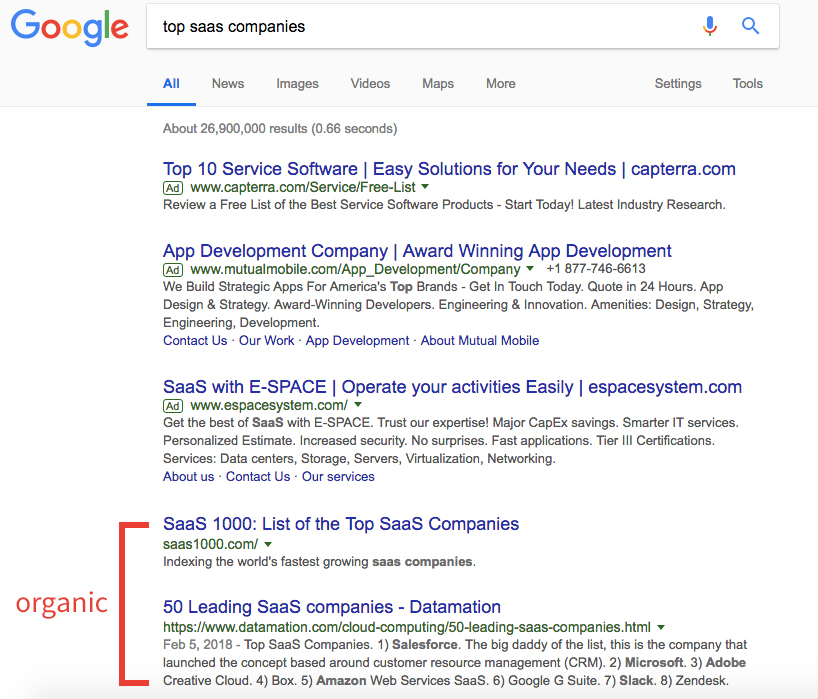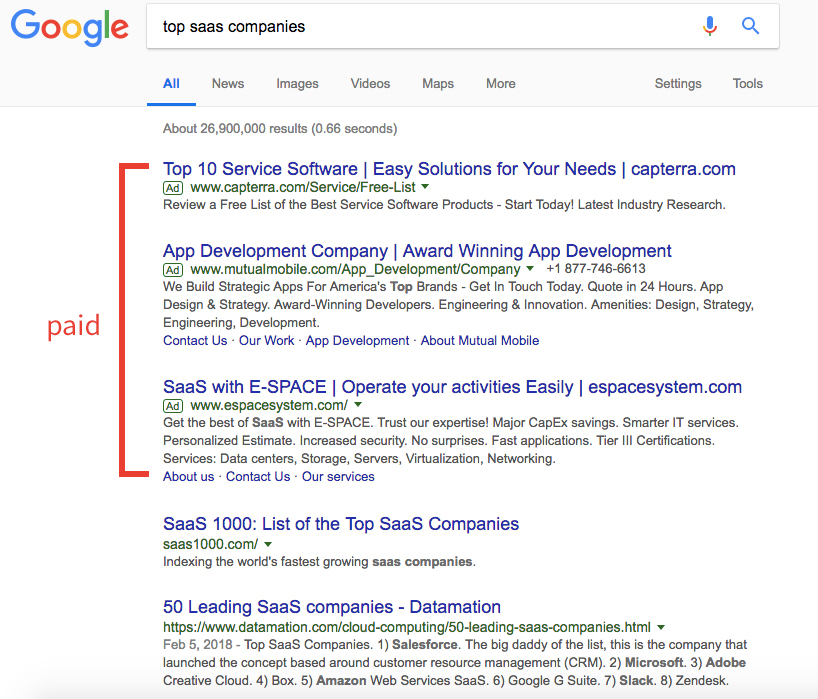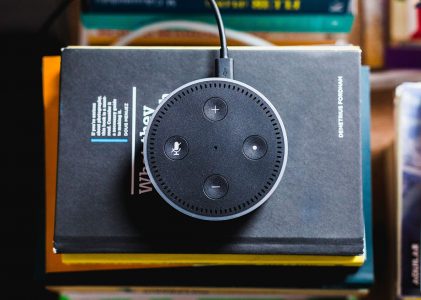Modern life is thoroughly linked to the use of search engines. Just think about how often you suggest “Googling it” when you need pretty much any kind of information. A fraction of a second after you search for something on a search engine like Google (or others like Yahoo and Bing, who are steadily climbing in market share), millions of results populate on the search engine results page (SERP).
via GIPHY
If your business has an online presence, understanding the difference between organic and paid search, and how it can be applied to your business, is critical. Read on to learn more about the basics of each, and how you can (spoiler alert) use both to drive more traffic to your website.
Let’s break it down for you.
Paid vs. Organic Search: What’s the Difference?
Organic Search
Organic search results are the “natural” results found underneath the ads in the SERPs. They are natural in the sense that the search engine algorithm analyzing all the pages across the web felt these pages contained the most relevant information for your search.

The algorithm has decided that these websites will have the most useful information according to what you are trying to discover, which is why they rank highly for the keywords you typed in your query. The page is scanned for various things (like proper title tags, meta description, URL, keywords, awesome content, etc) and the more relevant the information, the higher the ranking.
To optimize your page in order to rank in the organic search results, you need to employ SEO (search engine optimization) techniques to make your page as desirable to search engine algorithms as possible. Some companies dish out a lot of money to specialized SEO agencies in order to rank on the first page – or the number one goal, to rank as the first organic result. However, ranking with SEO is a long term process, and often takes upwards of six months to climb the rankings.
But don’t despair, basic SEO techniques are not as complicated to implement as they seem. There are lots of handy guides and how-to’s to help you wrap your mind around it all and get started. Developing an ‘SEO-approach’ to your business is not only a good idea, it’s imperative to your success!
Paid Search
Paid search results are basically ads paid for by businesses in order to rise above the organic results in the fastest way possible. Marketers invest money into SEM (search engine marketing) in order to boost their website to (ideally) the first page when someone types an inquiry using specific keywords.
For ads showing up on Google, marketers use AdWords to craft ads and bid on placement opportunities in the auction. On the SERP, you can usually tell the paid results from the organic ones with visual clues that distinguish them. Paid results will usually appear first on the page and have a small outlined ‘Ad’ label on the lefthand side of the URL.

It’s assumed that whoever pays the most in the AdWords auction will have the best visibility, but much like the rules surrounding who ranks organically, Google has processes in place (quality score, copy rules, landing page quality, and more) to make sure that the ads that rank are still highly relevant for searchers. In both organic and paid search, Google puts user experience above all else.
In order to get a positive ROI (return on investment) with paid search, it’s important to know what you’re doing – or employ an agency that specializes in PPC. At Acquisio, we’ve developed artificially intelligent technology that helps agencies get the most value for their budget (and yours). For the non-experts among us, we also developed a smart product called Promote that works to help small businesses, and those new to PPC, see a positive ROI on their paid search efforts.
But first, it’s a good idea to start from square one and find out how paid search works. Check out our crash course in PPC for beginners to learn everything you need to know to get started:
Paid vs. Organic Search – Which Strategy is Best for my Business?
Marketers need to use both paid and organic search strategies to compete in today’s digital landscape. Organic search results, generally speaking, have an evergreen presence. That means they can continue to climb up the rankings over time, assuming the information remains relevant. Paid ads, on the other hand, stop displaying as soon as you stop paying.
If you are new to digital marketing or have a lean marketing budget, choosing the right strategy may feel overwhelming. But don’t worry – we’re going to lay out the pros and cons of each so you can make the best (and most informed) decisions for your business.
It’s also important to fully understand how and where your customers are looking for solutions online (do your research!) so you don’t waste any of your budget on tactics that might not make sense for your business. For example, if you have a very visual brand like a clothing company, Instagram ads may make sense, where that might not make sense for another type of business. Your time, and your money, is precious! Delivering the right answers where your customer base is asking the questions can make all the difference.
Organic Search Pros & Cons
In general, having a presence on the first page of the SERPs sends a message that you are a trusted source of information. After all, you beat out millions of other businesses for that spot! It suggests your service is one of the most widely relied upon, and there’s an automatic perception of credibility and respectability for your business.

That’s a lot of small businesses!
Pro: Authority & Credibility
When you follow SEO best practices on your website, you will naturally earn authority and rank higher on search engines. This means Google (and other search engines) considers you a reliable source of information for certain keywords, pushing your website higher up in the list on SERPs for searches containing those terms. The more authority your site has, the higher you will rank – and the higher you rank, the more authority your site earns (what I like to call the serple of life).
But even more important than that, the people doing the searching will consider your site a go-to destination for the information they need. People tend to trust organically ranked web pages more than the ads, so they click on them. When it comes to click-throughs, organic beats paid 65% of the time for desktop searches. Your optimized pages and amazing content will prove to Google and the world that you know what you’re talking about!
Pro: Cost
Although you can spend a lot of money optimizing for organic search, you don’t have to. There are a ton of free resources (make sure they are from reputable sources!) available to get you started with SEO and help your website rise above your competitors. Although it may be more time consuming (more on that later), the long-term results will be worth it.
Pro: Top of Funnel Clicks
Click-through rates are generally higher for websites that appear organically at the top of SERPs, especially when you are talking about “top of funnel” searches. A top of funnel search is the kind that doesn’t show a strong purchase intent yet (e.g. “where can I buy….” or using price-related words like “cheap” that suggest the searcher wants to shop) but rather still in the researching stage of the journey. SEO gives you an opportunity to capture these top of funnel searchers in a way you may not have been able to before. And once they are on your site, you can push them further down the funnel with your awesome content and turn them into a paying customer!
Pro: Longevity
Unlike paid search, organic search is the gift that keeps on giving. If you optimize your site and continue to implement SEO best practices in your processes, you will start to rank and continue to rank (see the serple of life, above) if the content meets Google’s requirements. Because the content has “earned” the ranking, it can stay up in the top for quite some time. And once you get those high rankings, it’s easier to hang onto them. Have you ever searched for something and noticed the article was from 2013? Although the content may be getting on in age, the search engine still thinks it’s a valuable resource for you, years after its intended reception. All that to say, the effort of creating optimized content and getting SEO right can pay off over a longer period of time.
Cons: Time & Resources
Of course, nothing in this world is truly free. Although SEO might not hit your wallet as hard as paid search might, there is still a significant amount of time and resources required to get it right. SEO is a long-game approach that takes time to craft content and implement it across your site, and it often takes months to see results.
You’re also not alone in the game – keywords can be very competitive and you might be fighting against other businesses with more time and resources to invest in creating high quality, SEO-focused content and techniques. However, if this is your business, putting the required time and effort into ranking organically is something that will certainly pay itself off, even if it takes a little longer than expected.
Paid Search Pros & Cons
What could be better than getting your message out there quickly and efficiently to people who are actively looking for what you offer? Paid search has a lot of benefits, but those benefits come at a cost (sometimes a significant one). It’s fast, fairly easy, and highly targeted – but also expensive and short lived. So what is it about paid search that has people coming back again and again?
Pro: Faster & Easier
Developing evergreen SEO content and waiting for it to climb up the Google rankings can be a slow, labor-intensive process. If you don’t have that much time, paid search can get you in front of new audiences much quicker. Without a doubt, there is no faster way to be the very first result people see when they land on an SERP than with PPC. If you follow AdWords best practices, optimize your ads, develop a great landing page, and have a competitive budget (for your industry) than you will be able to attract targeted customers who are ready to buy.
Crafting a successful PPC campaign isn’t exactly a walk in the park. But paid search efforts, in a way, are simpler to get off the ground than organic search campaigns. It certainly requires fewer resources (like a team of writers to develop long form, SEO-friendly content), but it also requires a level of expertise to manage campaigns to avoid misspending budget on unqualified traffic. Although some aspects of paid search campaigns can seem daunting, machine learning technology is making the process much easier and much more accessible for small businesses.
Pro: Targeted
Every year, audience targeting gets more sophisticated across the platforms. Although GDPR and privacy is a top concern, targeting remains an ongoing and important part of digital marketing. Google, Facebook, Instagram, Bing and others all offer targeting methods that help you specify exactly who you want to see your ads. On Facebook for example, you can target by location, age, educational level, marital status, shopping behaviors and more. This kind of granularity means that you’ll have access to people that are much more likely to click on your ad, engage with your content, and buy your product.
Pro: High Purchase Intent
Paid search gives you the opportunity to put your product or service in front of people who have a high purchase intent. When the searcher is that far down the funnel, relevant ads at the top of the fold tend to get a larger share of click-throughs (and clicks on paid search are rising). If the keywords show a desire to buy, and an ad specifically for the product or service being searched for comes up on the SERP, the searcher’s problem is solved fast. However, keyword research and testing are required to refine your campaigns so they match what people are looking for. Well thought out campaigns will result in a higher quality score (QS) and have better visibility.
Cons: Cost & Longevity
With paid search, you pay to play. Depending on the competition for the keywords you want to bid on, you may end up needing a significant budget to compete. However, the competition in every industry differs and the price of keywords varies depending on many factors (broad vs. exact match, long tail vs. short, branded vs. non-branded, etc). And while the cost may end up in the thousands of dollars for some industries, in the end what matters is your return on investment. If you spend 2K on a paid search campaign but end up making 10K back, it’s probably worth the investment! Adding machine learning to the mix also has the potential to significantly increase ROI.
Alongside this, the visibility of these campaigns and the potential for a higher ROI only lasts as long as the campaign is running – and the campaign only runs as long as you are still spending. When the well runs dry, that’s it, until more budget is allotted.
Paid and Organic Search – a Balancing Act
While there are pros and cons to investing in paid and organic search strategies, the best strategy of them all is to find a balance between the two. It’s important to target customers at both the top and the bottom of the funnel (and everywhere in between) in order to capture more leads for your business.
By optimizing your site using SEO tactics, you ensure that your website content is showing up when people are digging through the organic results – potentially for years to come. Not forgetting about those nearing the bottom of the funnel, a strong paid search game ensures that your business is front and center for those ready to make a purchase.
If your goal is to make it easy for potential customers to find you online, then a strong marketing strategy would utilize both organic and paid search techniques. A combination will deliver the best results and have new customers discovering your business in no time!
Image Credits
Feature Image: Unsplash/ rawpixel
GIF via Giphy
All screenshots taken by author, July 2018.



